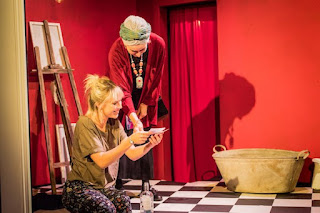Every language is
facts, it's only a matter of speaking it…
I prepared for The
Lesson by learning nothing about Eugene Ionesco, I knew this play was going
to be different and how important it is to the Hope’s Artistic Director Matthew
Parker, but I didn’t want to cheat, I wanted to experience it all freshly cut. I
wasn’t disappointed – even in my ignorance, my preconception was that this
would be another piece of dynamic, jarring, theatre – and it surpassed
my lazy assumptions by slicing through the fourth wall and imbedding itself in
my mind even after a long working afternoon spent discussing data…
The play’s classroom turns out to be more like a torture
chamber than anything else and it wrongfooted the audience who didn’t know whether
to laugh or gasp; the main thing they had in common was an open mouth. Some
were obviously familiar with the play and the style, but others were reacting with
fresh-faced glee and/or horror.
I’ve never seen a funnier play about indoctrination, miss-communication
and fascism but that’s damning The Lesson with faint praise. It’s a furiously-complex piece
that operates on many levels all at the same time - all of them in your face.
Now I’ve read up on Ionesco and I understand that he
wrote this in Post-War France for a first production 1951 and it has been in
continuous performance ever since… it really is a play for today that shows
just how quickly discourse turns sour and fatal decisions made based on ideas
that suit rather than anything else.
 |
| Sheetal Kapoor |
It begins with a Maid (Joan Potter) cleaning up the
classroom of a Professor (Roger Alborough). The doorbell rings and a new Pupil
arrives for her lesson (Sheetal Kapoor) with the Professor. The atmosphere is
strange and yet here we have a perfectly ordinary scenario; a classroom, an
exchange of knowledge what could be safer? What could be more normal?
In this World
mademoiselle, one can never be sure of anything…
The Professor comes into the room and starts to assess
his eager new pupil who seems as bright as a button! It’s absurdist with her answers
to simple questions pleasing him no end as we sit thinking of course 1 + 1
equals 2… but we’re being set up and so skilfully as well. What we think we see
is only a pretext for a deeper discourse on the nature of mutual understanding.
So, when the Pupil suddenly wrong-foots expectations by
not being able to subtract 3 from 4 we have to readjust expectations and try to
work out new rules for this game.
We struggle to see the logic – how can she not subtract?
The Pupil seems only capable of learning through wrote; she has memorised the
answers to billions of calculations without being able to work them out for
herself… that’s brilliant but it’s also disturbing: what kind of society doesn’t
allow for the imagination to deviate through creative processing?
The Pupil starts to get tooth ache – a manifestation of
the shadow discourse twisting violently in the room. The Maid returns warning
the Professor to avoid other subjects, appalled when he suggests philology: “the worst of all!”.
 |
| Toothache no barrier to learning... |
Pronunciation is
itself, worth an entire dialect!
The tension between Pupil and Professor mounts along with
the violence of his language and we look on in dread – what started off as highly
formalised politeness has descended into something far more serious and
theatrically wonderful!
This is another stunner from The Hope and I swear its
playroom morphs like a Tardis in certain productions: I always remember the space
differently based on the play. That’s down to ace direction from Artistic
Director Matthew Parker along with sound design, lighting and set layout – take
a bow Simon Arrowsmith, Chris McDonnell and Rachael Ryan who has the walls
covered in chalked calculations; as if we’re the blackboard!
The performers grew larger than life in front of us as audience
reality was distorted by the sheer intensity of Roger Alborough’s Professor as
his madness proved malleable and self-normalising: we’ve seen so much of that recently
haven’t we?
Sheetal Kapoor was the perfect pupil, polite and
vulnerable in her conviction that learning would be the all she needed to do. Joan
Potter’s cleaner was also relatable as she enabled, acquiesced and kept calm
and carried on…
 |
| Joan Potter |
IThankYou Rating: ***** 2+3 equals 5 as does 7-2 and 19+33. This small space above busy Highbury is transformed into a darkly magically-real else-world… The Man in the Upper Street Hope and Anchor.
The Lesson plays
until 13th October and tickets can be obtained from the Hope Box
Office on and online.











